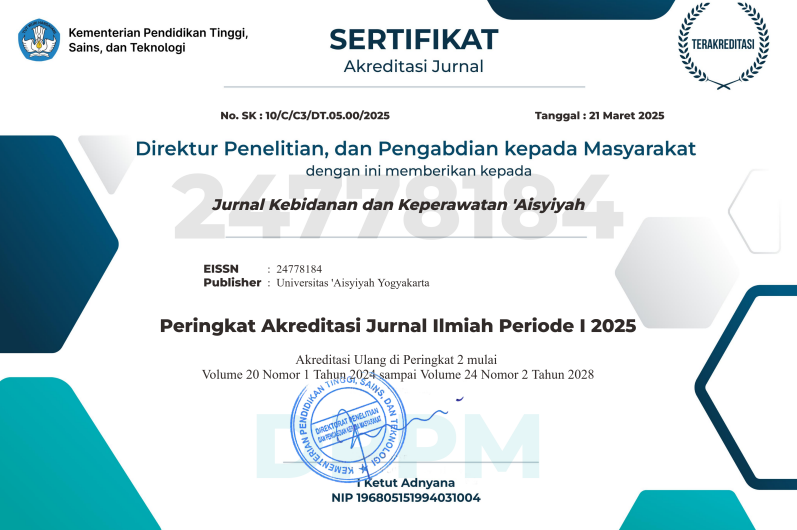Prenatal Attachment Relationship with Pregnant Women’s Compliance in Carrying Out Antenatal Care Visits
DOI:
https://doi.org/10.31101/jkk.3565Abstract views 973 times
Keywords:
antenatal care; commpliance; prenatal attachment; third-trimester pregnant womenAbstract
Downloads
References
Alhusen, J. L., Gross, D., Hayat, M. J., Woods, A. B., & Sharps, P. W. (2012). The influence of maternal-fetal attachment and health practices on neonatal outcomes in low‐income, urban women. Research in nursing & health, 35(2), 112-120.
Alvianty, F. N., & Suryaningsih, E. K. (2016). HUBUNGAN DUKUNGAN KELUARGA DENGAN MATERNAL-FETAL ATTACHMENT PADA IBU HAMIL TRIMESTER III DI PUSKESMAS JETIS KOTA YOGYAKARTA. Universitas' Aisyiyah Yogyakarta.
Aryani, F., Raden, A., & Ismarwati, I. (2017). Senam Hamil Berpengaruh Terhadap Tingkat Kecemasan pada Primigravida Trimester III di RSIA Sakina Idaman Sleman, D. I Yogyakarta. JNKI (Jurnal Ners dan Kebidanan Indonesia)(Indonesian Journal of Nursing and Midwifery), 4(3), 129-134.
Astuti, Y. L., Chou, H.-F., Liu, C.-Y., & Kao, C.-H. (2021). The Effect of Prenatal Gentle Yoga on Maternal-Fetal Attachment among First-time Expectant Mothers in Indonesia. Journal of Midwifery & Reproductive Health, 9(3).
Daryanti, M. S. (2019). Paritas Berhubungan Dengan Pemeriksaan Antenatal Care Pada Ibu Hamil Di Bidan Praktek Mandiri Yogyakarta. Jurnal Kebidanan, 8(1), 56-60.
Dinkes. (2022). Profil Kesehatan Kota Yogyakarta Tahun 2022.
Fatimatasari, F., Sa’adi, A., & Fatmaningrum, W. (2017). Frekuensi Antenatal Care Tidak Berhubungan dengan Tingkat Pengetahuan Perawatan Kesehatan pada Ibu Nifas. JNKI (Jurnal Ners dan Kebidanan Indonesia)(Indonesian Journal of Nursing and Midwifery), 5(2), 100-105.
Heksaputra, D., Bahrudin, M. H., Fauziyah, A. K., & Wijaya, D. P. (2021). ANALISIS ANTENATAL CARE (ANC) PADA SURVEILANS KESEHATAN IBU DAN ANAK DENGAN TAHAPAN AGREGASI PIPELINE NOSQL. Indonesian Journal of Business Intelligence (IJUBI), 4(1), 16-24.
Kemenkes, R. (2021). Profil Kesehatan Indonesia 2020. Kementrian Kesehatan Republik Indonesia, 139.
Lamdianita, R. (2019). Hubungan Antara Prenatal Attachment Terhadap Kepatuhan Ibu Hamil Dalam Melaksanakan Kunjungan Antenatal Care Trimester III (K4) Di Wilayah Puskesmas Kedungkandang Kota Malang. Universitas Brawijaya.
Maddahi, M. S., Dolatian, M., & Talebi, A. (2016). Correlation of maternal-fetal attachment and health practices during pregnancy with neonatal outcomes. Electronic physician, 8(7), 2639.
Mariani, M., Wahyusari, S., & Hikmawati, N. (2020). Edukasi Prenatal Attachment Dapat Meningkatkan Kelekatan Ibu Dan Janin Pada Ibu Hamil Risiko Tinggi. Jurnal Ilmiah Perawat Manado (Juiperdo), 8(01), 44-61.
Mursyida, R. F., & Fithriani, Z. W. (2023). HUBUNGAN ANTARA PRENATAL ATTACHMENT DENGAN KEPATUHAN KONSUMSI TABLET TAMBAH DARAH PADA IBU HAMIL TRIMESTER III DI WILAYAH KERJA PUSKESMAS BATULENGER KECAMATAN SOKOBANAH KABUPATEN SAMPANG. Health Sciences Journal, 7(2), 93-101.
Oktia, V., Anggita, K. D., & Maydinar, D. D. (2023). HUBUNGAN ANTARA KECEMASAN PADA IBU HAMIL TRIMESTER III DENGAN SKOR PRENATAL ATTACHMENT PADA PASIEN PRAKTIK MANDIRI BIDAN SUSI DESA AIR SEBAKUL BENGKULU. Jurnal Kesehatan Saintika Meditory, 6(2), 186-192.
Paramita, N. M. D., Sriatmi, A., & Nandini, N. (2023). DETERMINAN UTILISASI LAYANAN ANTENATAL CARE 6 KALI DI KOTA SAMARINDA. Jurnal Ilmu Kesehatan Masyarakat, 19(2), 142-153.
Prihandini, S., & Primana, L. (2019). Faktor-Faktor yang Memengaruhi Hubungan Kelekatan Ibu terhadap Janin dalam Kandungan. Buletin Psikologi, 27(2), 125-135.
Rahman, T., Fatimah, F., Mulyaningsih, S., Paramita, D. P., Lestari, P., & Delia, A. R. (2022). The correlation between pregnant women with COVID-19 and mode of delivery. JNKI (Jurnal Ners dan Kebidanan Indonesia)(Indonesian Journal of Nursing and Midwifery), 10(3), 262-271.
Riskesdas. (2018). Hasil Utama Riskesdas 2018.
Salehi, K., Taleghani, F., & Kohan, S. (2019). Effect of attachment-based interventions on prenatal attachment: a protocol for systematic review. Reproductive health, 16, 1-5.
Samutri, E., & Endriyani, L. (2021). Education of fetal movement counting: an effort to increase knowledge and compliance of pregnant women to do self-assessment of fetal wellbeing.
Shinta, A. R. (2017). Pengaruh Frekuensi Antenatal Care Terhadap Kepatuhan Mengkonsumsi Tablet Fe Pada Ibu Hamil Di Puskesmas Sedayu 1 Bantul. UNIVERSITAS ALMA ATA YOGYAKARTA.
Sjariati, N. T., & Primana, L. (2020). Persepsi Dukungan Keluarga Terhadap Kelekatan Ibu Dan Janin. Journal of Psychological Science and Profession, 4(3), 154-161.
Sukriani, W., & Suryaningsih, E. K. (2018). Faktor Risiko yang Berhubungan dengan Skor Maternal-Fetal Attachment pada Ibu Hamil. Jurnal Kesehatan, 9(2), 185-191.
Syafitri, N. P. (2019). Hubungan Status Ekonomi Ibu Hamil Terhadap Kunjungan Antenatal Care (ANC) di Puskesmas Matraman Jakarta Timur. Universitas Binawan.
World Health Organization. (2022). Maternal mortality measurement: guidance to improve national reporting: World Health Organization.
Zahrani, S. T., Rafiei, E. H., Hajian, S., Majd, H. A., & Izadi, A. (2020). The correlation between spiritual health and maternal-fetal attachment behaviors in pregnant women referring to the health centers in Qazvin, Iran. International journal of community based nursing and midwifery, 8(1), 84.
Zuchro, F., Zaman, C., Suryanti, D., Sartika, T., & Astuti, P. (2022). Analisis Antenatal Care (ANC) Pada Ibu Hamil. Jurnal'Aisyiyah Medika, 7(1).
Downloads
Published
How to Cite
Issue
Section
License
Copyright (c) 2023 Jurnal Kebidanan dan Keperawatan Aisyiyah

This work is licensed under a Creative Commons Attribution-ShareAlike 4.0 International License.
With the receipt of the article by the Jurnal Kebidanan dan Keperawatan Aisyiyah Editorial Board and the decision to be published, then the copyright regarding the article will be diverted to Jurnal Kebidanan dan Keperawatan Aisyiyah. Universitas 'Aisyiyah Yogyakarta as the publisher of Jurnal Kebidanan dan Keperawatan Aisyiyah hold the copyright regarding all the published articles in this journal.
Jurnal Kebidanan dan Keperawatan Aisyiyah is licensed under a Creative Commons Attribution-ShareAlike 4.0 International License.
















